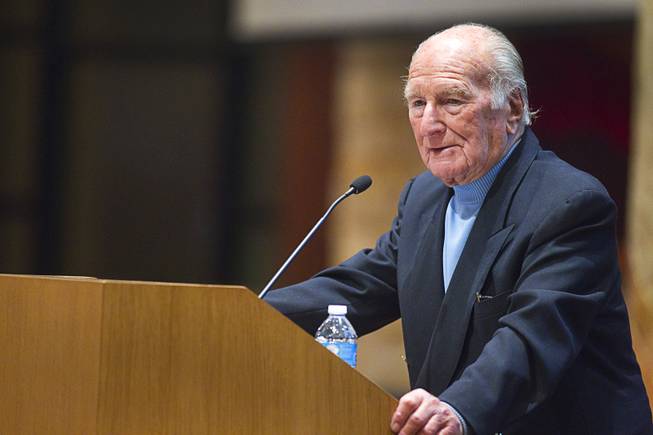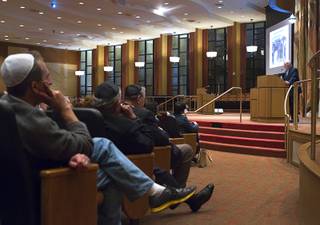
Ret. Major Leonard Berney speaks at Congregation Ner Tamid in Henderson Monday, Jan. 27, 2014. Berney was a member of British forces that liberated the Bergen-Belsen concentration camp during Word War II. The presentation was part of International Holocaust Memorial Day.
Tuesday, Jan. 28, 2014 | 2 a.m.
The grainy, black-and-white photos don’t even begin to tell the whole story.
Nothing can quite capture the squalor of the Nazi concentration camp — the overwhelming stench inside the packed huts, the inhumanity of hundreds of dead corpses or the vacant looks in the eyes of the near-dead prisoners. Only those who were there know the full horrors, said Lt. Col. Leonard Berney, a former British military officer.
He was one of them. On Monday evening, Berney did his best to describe what he called the “indescribable” to 325 people, including teens generations removed from World War II, at Congregation Ner Tamid as part of International Holocaust Memorial Day.
He stood at a podium gripping his cane. Behind him, historical photographs lingered on large, white screens.
“We were battle-hardened,” Berney, now 93, said. “But this was something nobody could take in at all.”
In April 1945, Berney was one of the British military officers tasked with organizing the liberation of the Bergen-Belsen concentration camp in Germany. Mere weeks before the German surrender to Allied forces, two German officers visited a British general with a proposition: They would hand over the concentration camp to the British if they agreed to a cease-fire and no-fly zone around the camp. The camp had become overrun with typhus, an often-fatal disease transmitted by lice.
Several days later, Berney and a handful of other British officers arrived at the camp.
“What we saw was a long road with huts,” he said. “As we went in, we began to see the inmates.”
Huts meant to hold 100 people housed as many as 700, with multiple people sleeping on single cots and living among human waste. There were no bathrooms.
Outside, piles of dead bodies were discarded under trees. Children walking by the corpses seemed unfazed — an indication to Berney and his fellow officers that conditions had dehumanized these desperate people, many of them Jews but also foreign nationals and others deemed undesirable by Adolf Hitler’s regime.
The camp contained 60,000 people, and 10,000 already had died there by the time the British took over, Berney said. Five-hundred more people were dying each day.
“We were faced with a disaster on a massive scale,” he said. “That was clear.”
The British military scrambled to form a plan of action that would save as many lives as possible. They needed to deliver food and water, bury the disease-ridden dead bodies, establish a hospital off site for the sick and begin evacuating the camp.
For food, they hauled in loads of army ration meals, such as spam, sausages, cheese and baked beans. But the plentiful food had an unexpected, negative consequence: It was too rich for the starved people.
“We inadvertently probably killed 1,000 to 2,000 people,” Berney said. “It’s terrible to think of, but that’s what happened.”
Within a matter of weeks, however, the British military had evacuated the prisoners to a shiny, new German army barracks, which they had transformed into a 15,000-bed hospital and temporary shelter for the survivors. Their goal was to give the concentration camp survivors a civilized life, he said.
For two years after the war, Berney suffered flashbacks to the grisly images he witnessed inside the Bergen-Belsen camp, which was later burned down.
About a decade ago, Berney — now retired and living aboard a luxury ship that travels the world — began sharing his Holocaust story. On Monday evening, it earned him a standing ovation.
“I’ll never forget, but life has to go on,” he said.



Join the Discussion:
Check this out for a full explanation of our conversion to the LiveFyre commenting system and instructions on how to sign up for an account.
Full comments policy